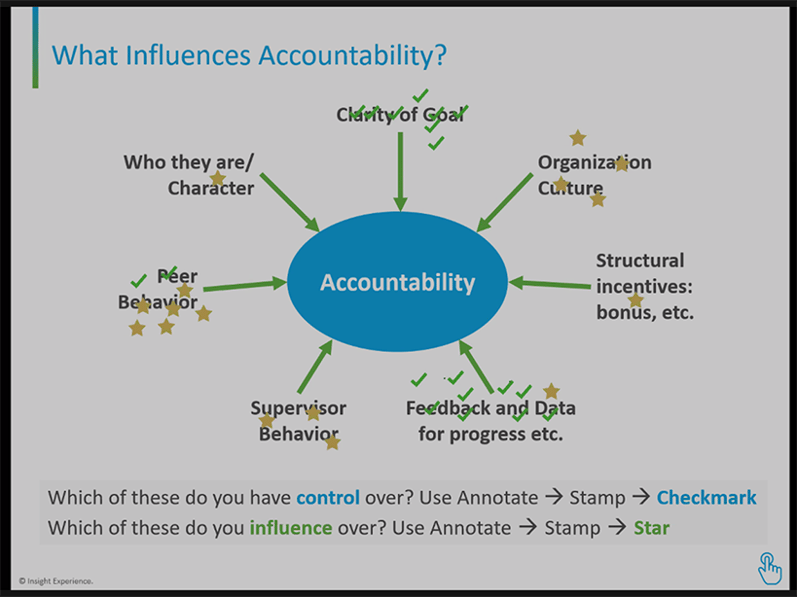During the summer of 2019, we here at Insight Experience created an infographic detailing both what leaders learn from a Business Simulation and how leaders learn during a business simulation. The rapid push to virtual work has made the summer of 2020 look very different from both a work and life perspective. Yet, though so much else has changed, the impact of a business simulation remains intact. The combination of experiential learning and collaborative exercises in which individuals connect and interact makes business simulations the perfect solution for a virtual leadership development experience. Business simulations have eight key elements that make them effective in the virtual setting as they drive interaction and create opportunities for feedback and reflection.
Interactions and Engagement
1. The Simulation Platform
Computer-based simulation platforms can easily be shared via Zoom, WebEx, Microsoft Teams, or any collaboration software that has screen-sharing capabilities, which create a shared experience among program participants. Business simulations construct experiences for leaders of all levels to interact in a business context that is relevant and realistic to their work. The decisions that leaders will face will mirror the challenges and tensions of their day-to-day work, allowing them to practice making tough choices in a safe environment. Simulations can be designed as a series of rounds that take between 60-120 minutes each, creating an opportunity for more experiential learning as opposed to more traditional lecture-style sessions, which many virtual trainings rely upon heavily.
2. Simulation Teams
Simulation teams are made up of four to six participants who work to make consensus decisions about leading a fictional business. This model of decision-making creates open space for debate and discussion. Through this, team members share real-world stories that help them align their choices in the simulation. Over the course of the simulation rounds, the teams develop new relationships with one another, and leave with a host of new professional connections.
3. Networking
The virtual setting provides a unique opportunity for networking across large organizations and geographies; it is easier and more cost-effective to gather leaders from across the country or across the world for virtual training. Through simulation decision-making and the sharing of results, there are numerous opportunities for collaboration and networking between leaders across the firm. For example, if you start a program at 10 a.m. Eastern, you can engage leaders from across North America, South America, and Europe.
Feedback
4. Comparative Results

Following each round of simulation decision-making, an expert facilitator will debrief team decisions and lead a discussion around the implications of strategic choices. Leaders will be able to see the business results that their leadership choices drove and how their choices compared with the choices of their peers. Using annotation, breakout rooms, and other virtual facilitation techniques, these debriefs drive participant interaction and reflection effectively in a virtual environment.
5. Reports
Detailed team-specific qualitative and quantitative reports are available to review after each round of decision-making. These reports give personalized feedback about the team’s choices and the business impacts they drove. Specific team feedback allows leaders to understand the interpersonal and business effects of their choices be it through a P&L, business score card, or perspectives from simulation characters. These reports can be emailed or easily uploaded to a shared platform for teams to access and reference as a group, further generating conversation.
6. Role Plays
While the simulation platform provides space to practice making leadership choices, at Insight Experience we have found role play activities to be some of the most thought-provoking components of a program. The opportunity to practice engaging in a difficult conversation is invaluable for leaders who are striving to develop their people, while still properly addressing the business need. For this exercise, one member of the simulation team engages with a character from the simulation to have a difficult conversation. Teams can then debrief the role play interaction to better understand their own behavior and the appropriate way to address the characters concerns. Not only does this experience mirror and help build appropriate skills for our current remote working conditions, it is an excellent way to get feedback on how individuals show up in a virtual environment.
Reflection
7. Overnight Reflection Surveys
Condensed program design, a few hours each day over consecutive days, creates the perfect opportunity for overnight reflection. In this program design, participants will spend some time each day attending to their day-to-day work as well as attending a synchronous learning experience. This combined approach allows leaders to implement their learnings real-time while having the space to reflect on their ability to implement key learning objectives. An overnight survey is a fast and simple way to gauge high-impact portions of the program and reveal key insights from the day.
8. Action Planning
Longer-term leadership development programs lend themselves to a more detailed and involved action planning process. Throughout the program, participants will be encouraged to engage with their action planning documents to think through how learnings can be applied back on the job. At the end of a program, leaders will have completed a complete plan that they are able to reference as they begin to integrate key learnings into their daily work.
Hesitant to bring your leadership development virtual?
Since the beginning of the COVID-19 pandemic, Insight Experience has put more than 600 leaders through virtual simulations. Some of our favorite quotes from participants:
“I enjoyed the program- the pace, content and the collaboration with the team. I've systemized and reinforced my experience with the more theoretical knowledge and got additional insights in the areas that were not my strengths. I found it extremely useful and I will approach building and executing strategies with more confidence. Thank you for introducing such an interesting content and turning the area of strategizing into an exciting learning experience.”
“Role plays gave the most immediate feedback, but the explanation of how the decisions / thinking process led to results (more than the results themselves) were super helpful to land the key learnings”

Krista Campbell
Krista Campbell is a Director who designs and facilitates business simulation-based learning programs at Insight Experience, an award-winning global leadership development company with an expertise in business simulations. She specializes in programs that promote communication, strategic thinking, and developing people.









